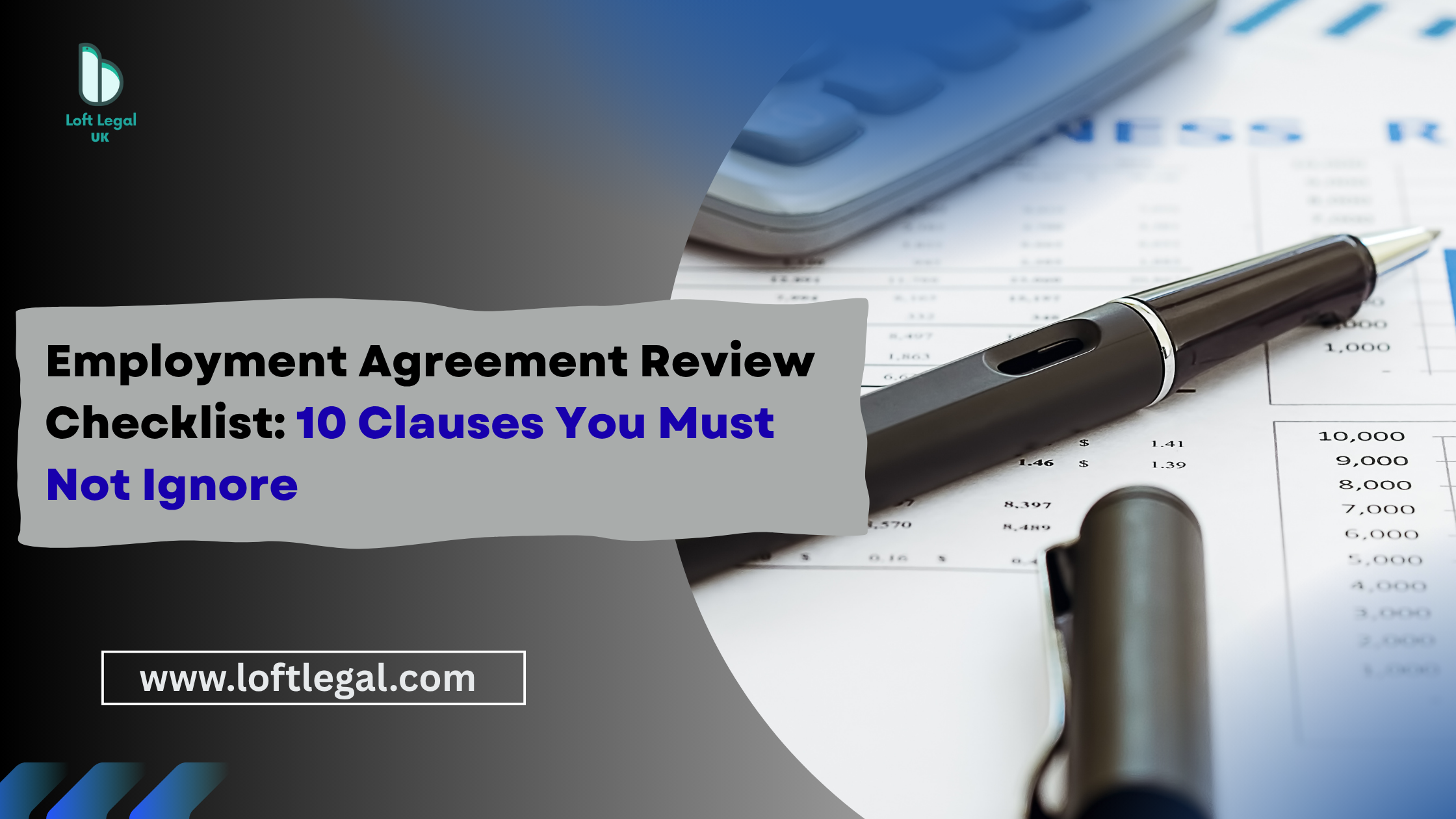How to Know If Your Employment Contract Is Fair Before Legal Help

Strong 8k brings an ultra-HD IPTV experience to your living room and your pocket.
Introduction: Why Reviewing Your Employment Contract Matters
Understanding your employment contract is the first step in protecting your career and financial future. Whether you’re starting a new job, switching roles, or renegotiating terms, your contract sets the foundation for your salary, benefits, job responsibilities, and termination conditions. Overlooking even a small clause can lead to long-term consequences — from lost income to limited job mobility or restricted career growth.
A common mistake many professionals make is signing their employment agreement too quickly — often without fully understanding its implications. Important clauses about non-compete agreements, severance, bonus eligibility, or intellectual property rights can be buried in legal jargon that’s easy to miss but critical to your future.
While hiring a lawyer to review your employment contract offers expert protection, it’s equally important to know how to identify red flags on your own. This awareness not only helps you ask smarter questions but also ensures you’re not walking blindly into an unfair deal.
1. What Makes an Employment Contract ‘Fair’?
A fair employment contract is one that clearly defines your rights and responsibilities — not just in legal terms, but in a way that feels respectful and balanced. It should protect your interests just as much as it protects your employer’s. That’s why an Employment Contracts Review is so important: it helps ensure everything is transparent, fair, and built on mutual respect from the start.
A fair contract ensures there isn’t a significant imbalance of power between you and your employer. It avoids one-sided clauses that give the company excessive control over your time, ideas, or future job opportunities. Instead, it promotes a mutual understanding, where both parties benefit and feel secure in the agreement.
Here are the key traits of a fair employment contract:
- Clarity: All terms should be written in plain, understandable language — especially around pay, benefits, working hours, job expectations, and termination policies.
- Legal Compliance: The contract must meet employment laws and standards in your province or country, including minimum wage, overtime, and workplace protections.
- Mutual Benefit: It should offer value to both sides — competitive compensation for you, and clear performance expectations for the employer.
- Flexibility and Protection: Fair contracts include reasonable notice periods, fair non-compete terms, and protection for your intellectual property and professional freedom.
By understanding what fairness looks like in an employment agreement, you’ll be better equipped to evaluate the terms — and know when to ask for changes or seek legal advice.
Clauses You Must Understand Before Signing Any Employment Contract
Before you put pen to paper, it’s essential to understand the clauses in your employment contract that can significantly impact your career, compensation, and legal rights. Here’s a breakdown of the key sections you should carefully review — or flag for legal help if anything seems unclear or one-sided:
1. Job Role & Duties
Your contract should clearly define your position, responsibilities, and reporting structure. Vague descriptions can lead to scope creep or unexpected job changes without your consent.
2. Salary, Bonuses, and Commission Structure
Look beyond the base salary. Understand how bonuses are calculated, whether commissions are guaranteed, and if any performance metrics must be met to receive them.
3. Benefits, Perks, and Stock Options
Review what benefits you’re entitled to, including health insurance, retirement contributions, vacation days, parental leave, and any stock options or equity packages. These can greatly impact your overall compensation.
4. Termination Terms (With or Without Cause, Severance)
Know the difference between termination with and without cause. Check for severance entitlements, and be sure the contract complies with local employment standards.
5. Probation Period
Understand how long your probation period lasts, what rights you have during that time, and how termination works if it occurs during this window.
6. Notice Periods
Your contract should state how much notice either party must give to end the employment. Short or unequal notice periods can leave you exposed if you’re let go unexpectedly.
7. Intellectual Property & Confidentiality
These clauses often say that any work or ideas you create while employed belong to the company. Make sure you’re not signing away more than necessary, especially if you’re in a creative or technical field.
8. Non-Compete and Non-Solicitation Clauses
These clauses may limit your ability to work for a competitor or contact clients or colleagues after leaving the company. Some are unenforceable or overly restrictive — be cautious and seek clarity.
Top 7 Warning Signs Your Employment Contract Might Be Unfair
Even a professionally worded contract can contain clauses that are unfair, unbalanced, or legally risky. Watch for these red flags — they could signal that the agreement favors the employer too heavily or leaves your rights unprotected:
1. Vague or Overly Broad Job Descriptions
If your role isn’t clearly defined, you could be expected to take on duties far beyond your original position — without additional pay or title changes. This lack of clarity makes it easier for employers to shift expectations without your agreement.
2. One-Sided Termination Clauses
Beware of clauses that allow the employer to terminate you with little or no notice, while requiring you to give long notice periods. Fair contracts apply consistent standards to both parties.
3. No Mention of Dispute Resolution
A good contract should explain how disputes will be handled — whether through mediation, arbitration, or legal action. If there’s no mention of a resolution process, you may face unnecessary legal hurdles if issues arise.
4. Extreme Non-Compete Clauses
Non-compete clauses that prevent you from working in your industry for extended periods or large geographic areas are often unenforceable — but they can still be intimidating and restrictive. Always question overly broad limitations.
5. Unclear Performance Targets Tied to Bonuses
If bonuses or commissions depend on meeting performance goals, those targets should be clearly stated. Vague or subjective criteria make it easier for employers to withhold pay you’ve earned.
6. Employer Owns Your Work “Outside Office Hours”
Some contracts claim ownership of anything you create while employed — even in your personal time. This is especially concerning for creatives, developers, or consultants with side projects or freelance work.
7. No Mention of Review or Renegotiation Periods
Contracts that don’t allow for regular reviews or updates can lock you into outdated terms. It’s fair to ask when the agreement will be revisited, especially if your role evolves over time.
If you notice any of these signs, don’t ignore them. While not all red flags mean the job isn’t right for you, they do warrant closer review — and possibly legal advice — before you commit.
4. Can You Review Your Contract Online? Tools That Help
If you’re unsure about your employment contract but not quite ready to hire a lawyer, Online Contract Review tools can offer a helpful first step. These platforms use legal templates, AI analysis, or access to affordable legal experts to help you better understand what you’re signing.
Popular Online Contract Review Platforms
Here are a few trusted online tools that offer employment contract templates, guides, or review services:
LawDepot– Offers customizable employment contract templates with explanations of standard clauses.
LegalZoom– Provides document review services and consultations with licensed attorneys at a fixed rate.
Rocket Lawyer — Allows you to create, store, and review legal documents, with optional legal advice.
DoNotPay — Uses AI to help identify questionable clauses or generate letters for dispute purposes.
HelloPrenup (for prenups, but worth noting for its automation of legal document review with real lawyer input — similar tech is expanding into employment contracts).
How Online Contract Review Services Work
These platforms typically function in one of three ways:
Template-Based Tools: You enter your contract details and receive feedback based on best practices.
AI-Powered Review: Some tools scan your uploaded contract and highlight risky or unusual clauses.
Attorney-Backed Services: You submit your contract and receive comments or edits from a licensed lawyer — often faster and more affordable than traditional consultations.
Pros and Cons Compared to a Lawyer
Online contract tools are a great way to educate yourself and spot obvious issues — but they may not replace the depth of a personalized review from an employment lawyer, especially for executive-level, creative, or complex roles.
When You Should Still Get a Lawyer Involved
While online tools and self-reviews can be a great starting point, there are times when the stakes are just too high to go it alone. If your employment contract includes a high salary, complicated terms, or anything that feels legally risky, it’s worth getting Lawyer Advice Online or speaking directly with an employment lawyer. A bit of guidance now can save you from serious issues down the road.
Here’s when it’s smart-or essential-to have an employment lawyer review your contract:
1. High-Paying or Executive Roles
The more you earn, the more complicated your contract tends to be. Executive-level agreements often include detailed stock options, golden parachutes, restrictive covenants, and performance-based pay — all of which need expert review.
2. Complex Bonus or Incentive Structures
If your income depends on commissions, stock vesting, or performance-based bonuses, make sure the terms are clear and legally enforceable. A lawyer can help ensure your compensation isn’t tied to vague or unreachable goals.
3. Non-Compete Clauses Across States or Countries
Laws around non-compete agreements vary widely by region. What’s enforceable in one state or country may be illegal in another. A lawyer can advise whether the clause is reasonable — or a career-limiting trap.
4. Changing Industries or Working Remotely
If you’re shifting to a new field, taking on hybrid/remote work, or juggling side projects, you’ll want to be sure your contract allows it. An employment lawyer can help clarify what’s allowed and what might cause conflict down the line.
5. Employer Is Unwilling to Change Contract Terms
If you try to negotiate and the employer refuses to budge — or says “everyone signs this” — that’s a red flag. A lawyer can help you navigate the power dynamics and propose fair compromises.
6. Any Red Flags Found During Self-Review
If you’ve spotted any of the issues discussed earlier — like unclear job duties, extreme non-competes, or one-sided termination clauses — getting a legal opinion can help you decide whether to push back, walk away, or renegotiate.
A one-time legal review is a small investment compared to the cost of being stuck in a restrictive, underpaid, or legally risky job. When in doubt, get clarity — your future self will thank you.
How Much Does a Lawyer Cost to Review a Contract?
Hiring a lawyer to review your employment contract can feel like an added expense — but in many cases, it’s a smart investment that protects your income, rights, and long-term career. Understanding how legal fees work can help you budget wisely and avoid surprises.
Typical Costs for Contract Review Services
Lawyers generally offer a few pricing models for employment contract reviews:
Flat Fees: Many lawyers charge a one-time fee for reviewing a standard contract, typically ranging from $200 to $750, depending on complexity and location.
Hourly Rates: More complex reviews or negotiations may be billed hourly, usually between $150 and $400+ per hour, depending on the lawyer’s experience.
Free Initial Consultations: Some employment lawyers offer a free 15–30 minute consultation to assess your needs before quoting a price for a full review.
Tips for Finding Affordable Legal Help
Use Lawyer Matching Services like Avvo, LegalMatch, or Law Society directories to compare rates and reviews.
Ask for Flat Fee Packages to avoid hourly billing surprises.
Check Local Legal Clinics or Legal Aid Programs — some offer employment law advice at reduced rates or for free.
Consider Virtual Legal Platforms like LegalZoom or Rocket Lawyer, which offer bundled legal review services at lower costs.
When Legal Review Can Save You Thousands
Paying a few hundred dollars now could save you thousands in lost bonuses, severance, or legal disputes later. Here are real ways a contract lawyer adds value:
Identifying hidden restrictions that limit your future job options
Ensuring you’re properly compensated for overtime, bonuses, or commissions
Helping you negotiate a better offer or avoid signing an unfair deal
Spotting non-compete or intellectual property clauses that could impact side projects or future work
What If It’s a Lease Agreement or Freelancer Contract?
Not all work-related contracts fall under standard employment agreements. If you’re signing a freelance contract or managing a lease agreement tied to your business or remote work setup, different legal considerations come into play — and they’re just as important to get right.
Employment vs. Lease Agreement Review vs. Freelance Contracts
Employment Contracts focus on job roles, compensation, benefits, and employer-employee obligations.
A freelance or contractor agreement defines a project-based or temporary working relationship, often without benefits or traditional employment protections.
A lease agreement review may be necessary if you’re renting office space, coworking facilities, or even a live/work setup — especially if it impacts your ability to work productively or run your business legally.
Each contract type carries different risks, and it’s important to understand the unique clauses that could affect your finances or legal standing.
Key Clauses to Watch in Non-Traditional Agreements
Freelancer Contracts: Look out for unclear payment terms, vague scope of work, ownership of intellectual property, liability clauses, and dispute resolution procedures.
Lease Agreements: Watch for hidden fees, automatic renewal terms, maintenance responsibilities, subletting restrictions, and clauses that limit how the space can be used for business purposes.
Should You Still Seek Legal Help?
Yes — often even more so. Non-traditional agreements can be even more one-sided or poorly written, especially when dealing with startups, landlords, or informal arrangements. A lawyer can:
Help you avoid liability traps
Ensure your rights as a freelancer or tenant are protected
Clarify tax and legal implications based on how you’re working
Whether it’s an office lease, client contract, or gig agreement, a quick legal review can prevent misunderstandings, lost income, or costly disputes down the line.
Conclusion: Know Your Worth, Protect Your Future
Your employment contract sets the foundation for your career — from your salary and benefits to your job security and future mobility. While doing a self-review is a valuable first step, some clauses require more than a quick Google search or online tool.
At Loft Legal, we believe you deserve clarity and confidence before signing any contract. Whether it’s an employment agreement, freelance contract, or lease tied to your work, our employment lawyers help you understand your rights and avoid costly mistakes.
✅ Understand your contract on your terms
✅ Use trusted online tools to get started
✅ Reach out when things get complex or high-stakes
FAQ: Employment Contract Review
Q1: Why should I have my employment contract reviewed by a lawyer?
Ans: A lawyer can identify hidden risks, explain legal jargon, and ensure the contract is fair and compliant. This helps protect your career, salary, and legal rights — especially in high-paying or long-term roles.
Q2: When is the best time to get my contract reviewed?
Ans: Before you sign. Once you accept the offer or start working, your ability to negotiate or challenge contract terms is significantly reduced.
Q3: How much does it cost to have an employment contract reviewed?
Ans: Most reviews cost between $200–$750 as a flat fee, or $150–$400+ per hour depending on the lawyer and contract complexity. Some firms offer free consultations.
Q4: What clauses should I pay the most attention to?
Ans: Watch for clauses on job duties, compensation, termination, bonuses, probation, non-compete restrictions, intellectual property, and notice periods — all of which impact your rights and future opportunities.
Q5: Can I review my contract myself using online tools?
Ans: Yes, platforms like LawDepot or LegalZoom can help you spot obvious issues. However, they don’t replace a personalized review by a legal professional who understands local laws and complex clauses.
Q6: Are non-compete clauses enforceable?
Ans: It depends on your location. Some jurisdictions (like California) prohibit them, while others allow them under specific conditions. Always check with a lawyer familiar with local employment law.
Q7: What if I already signed my contract — can I still make changes?
Ans: Sometimes, yes. You may be able to renegotiate during a role change, promotion, or contract renewal. A lawyer can advise if changes are legally or strategically possible.
Q 8: Do I need a lawyer if I’m just signing a short-term or freelance contract?
Ans: Yes. Freelancer agreements often include vague payment terms, IP ownership issues, or clauses that can affect your future work. A legal review helps protect your earnings and creative rights.
Q 9: Can I negotiate terms after getting legal feedback?
Ans: Absolutely. In fact, a lawyer can help you craft counter-proposals and communicate confidently during negotiations, ensuring you don’t agree to unfavorable terms.
Q 10: What’s included in a contract review with Loft Legal?
Ans: Our flat-fee service includes:
✔️ A detailed legal review
✔️ Plain-English summary of key risks
✔️ Personalized recommendations
✔️ Optional 1-on-1 consult with an experienced employment lawyerBy understanding what fairness looks like in an employment agreement, you’ll be better equipped to evaluate the terms — and know when to ask for changes or seek legal advice.
Note: IndiBlogHub features both user-submitted and editorial content. We do not verify third-party contributions. Read our Disclaimer and Privacy Policyfor details.





